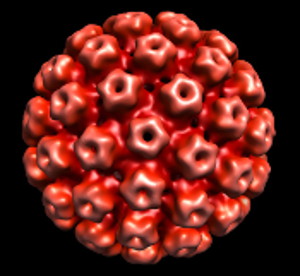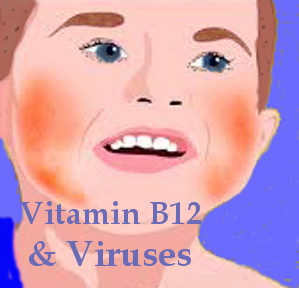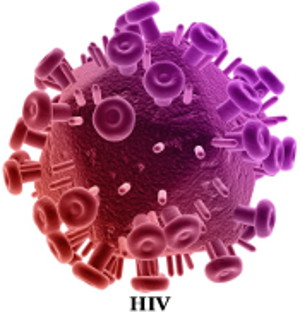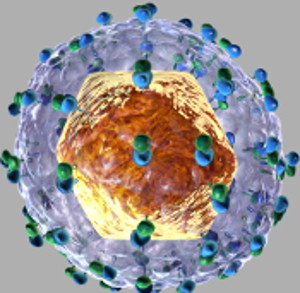B12 and Viruses
Frequently a person with a virus, be it HIV, Hepatitis C, Corona, Human Papillomavirus, etc. who has low vitamin B12 levels, will also have nerve problems. The intertwined reasons for this are that higher vitamin B12 levels protect against viruses, reduce the severity of the virus infection, and are therapeutic for nerves.
Parvo B19
Parvo B19, commonly known as Slapped Cheek Syndrome, inadvertently gives vitamin B12 a bad name.
Slapped Cheek Syndrome is sometimes inaccurately called B12 Virus. Other, but more accurate names are Parvo B19, erythema infectiosum, and fifth disease because it was the fifth in the historical classification of common skin rash illnesses in children. Slapped Cheek Syndrome is not, however, confined to children.

If you search the internet you will find people talking on forums about Parvo B19 as Parvo B12. I would guess these people have heard more about vitamin B12 than about the similar sounding Parvovirus B19 with the result they combine that with which they are familiar, with that about which they are concerned and worried.
Symptoms of Parvo B19 are:
- Fever
- Runny nose
- Sore throat
- Headache
- Upset stomach
Symptoms appear 4 to 14 days from contact with infection. Prevention includes washing hands and covering your mouth and nose when you sneeze or cough. Generally Parvo 19 goes away on its own within days to a week or a little more.
Viruses and Vitamin B12
There is a genuine connection between Viruses and B12. Awareness of the connection is advantageous. (Hint: B12 has a protective effect.)
HIV and Vitamin B12
As early as 1991 it was discovered that people with HIV infections were highly likely to have lower than normal levels of vitamin B12. In fact, about 20% of people with HIV who were in the study, were discovered to be suffering from neurological dysfunction and to have low vitamin B12 levels. When vitamin B12 was administered, it had a successful, therapeutic effect on the neurological dysfunction. Abnormal vitamin B12 metabolism in human immunodeficiency virus infection. Association with neurological dysfunction.
Another study with HIV patients discovered that those with lower B12 levels did more poorly in cognitive related tasks than those with higher levels. However, the cutoff point between higher and lower was 180. Plasma vitamin B12 level as a potential cofactor in studies of human immunodeficiency virus type 1-related cognitive changes. Read more.

180 is a very low B12 level to begin with. In other countries, a level of 500-550 is considered normal because any lower than that and cognitive impairment can be observed.
Hepatitis C and Vitamin B12
Hepatitis C appears to result from an failed immune response to virus infected cells. About 30% of people with Hepatitis C develop serious liver disease and need a liver transplant. Thus, it is important to know that vitamin B12 is stored in high concentrations in the human liver and that it can inhibit Hepatitis C infection.
Although an in vitro study found that vitamin B12 acted as an inhibitor to Hepatitis C “translation” which in turn affected viral replication and infection, vitamin B12 did not inhibit translation, etc., of Swine Flu Virus.
The study was conducted using fifty samples of stored sera from Hepatitis C carriers. The samples were tested for Hepatitis C viral load and total B12 level. These carriers were unstratified and chosen randomly from a pool of Hepatitis C carriers representing all clinical stages of disease state.
In some experiments we have observed a complete inhibition of HCV IRES -dependent translation, but we reproducibly observed a maximum inhibition of ‘60%. HCV IRES is short for Hepatitis C Virus Internal Ribosome Entry Site.
On the other hand, the study found that Hepatitis C carriers with unusually low vitamin B12 levels had low Hepatitis C Virus replication levels. The researchers theorized that the Hepatitis C virus evolved to use higher B12 concentrations.
Nevertheless, the researchers noted that at high cobalamin concentrations there was reduced viral translation that appeared to result in concentrations of viral proteins that are inadequate for replication and packaging. Read more.

Human Papillomavirus (HPV) and Vitamin B12
In a study involving 201 women with persistent or intermittent HPV it was discovered that women with higher levels of circulating vitamin B12 were less likely to have persistent HPV.
In fact, women with the highest circulating levels of vitamin B12, that is, greater than a level of 493.2, were significantly less likely to have persistent HPV infection.

The researchers wrote, “these data suggest a role for circulating vitamin B12 in early cervical carcinogenesis” which would mean that higher B12 levels correspond to lower rates of the initiation of cervical cancer formation. Read more.
Shingles and B12
Shingles is a virus.
A few years ago I had the misfortune to experience shingles. Remembering that, my first thought is, “Yikes, the Pain!” However, as a learning experience it was great. Vitamin B12 greatly reduced the severity.



